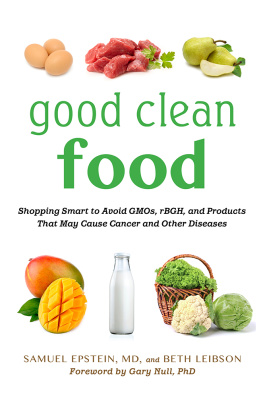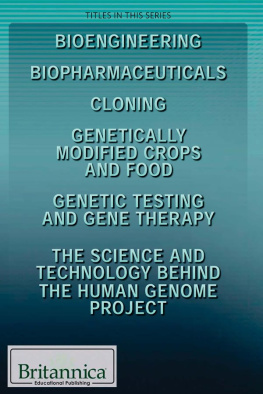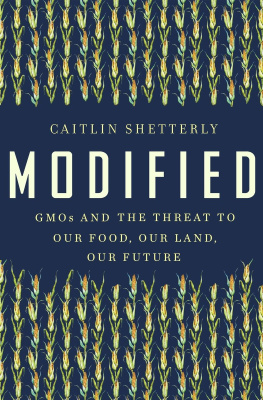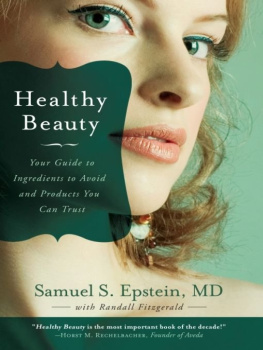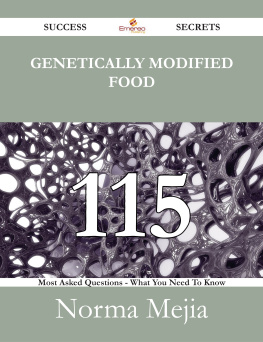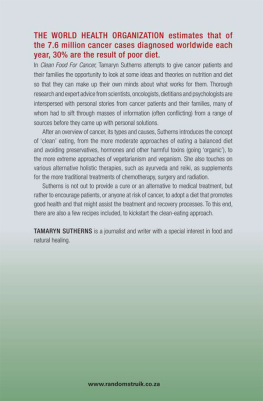Good Clean Food
Good Clean Food
Shopping Smart to Avoid GMOs,
rBGH, and Products That May
Cause Cancer and Other Diseases
By Samuel Epstein, MD, and Beth Leibson Foreword by Gary Null, PhD

Skyhorse Publishing
Copyright 2013 by Samuel Epstein, MD, and Beth Leibson
All Rights Reserved. No part of this book may be reproduced in any manner without the express written consent of the publisher, except in the case of brief excerpts in critical reviews or articles. All inquiries should be addressed to Skyhorse Publishing, 307 West 36th Street, 11th Floor, New York, NY 10018.
Skyhorse Publishing books may be purchased in bulk at special discounts for sales promotion, corporate gifts, fund-raising, or educational purposes. Special editions can also be created to specifications. For details, contact the Special Sales Department, Skyhorse Publishing, 307 West 36th Street, 11th Floor, New York, NY 10018 or info@skyhorsepublishing.com.
Skyhorse and Skyhorse Publishing are registered trademarks of Skyhorse Publishing, Inc., a Delaware corporation.
Visit our website at www.skyhorsepublishing.com.
10 9 8 7 6 5 4 3 2 1
Library of Congress Cataloging-in-Publication Data is available on file. ISBN: 978-1-61608-821-7
Printed in the United States of America
Contents
Foreword
by Gary Null, PhD
Author of The Complete Encyclopedia of Natural Healing and host of
The Gary Null Show
I n Good Clean Food, Dr. Samuel Epstein, one of our most insightful and authoritative voices on avoidable causes of cancer, has teamed up with health writer Beth Leibson to once again present persuasive and well documented evidence on the hidden health risks of everyday consumer products.
Good Clean Food does more than educate us as to the importance of avoiding industrial carcinogens in our food; it also presents scientific evidence compelling us to do so. Although warnings about the nations crisis in unsafe foods are continually mounting, the Food and Drug Administration continues to disregard them. Yet the links between our addiction to industrial milk and meat consumption and escalating cancer rates can no longer be ignored. Not surprisingly, the American Public Health Association voted to support a ban on US hormonal milk and hormonal meat in 2009. And, not surprisingly, our milk and meat are banned in the European Union, in addition to many other nations worldwide. What does this tell us about the safety of the food that we consume, and feed our children, morning, noon, and night?
How did we get here? In recent years, the food health dialogue in Washington has continued to be influenced and controlled the agricultural and food industrial complex headed by such mega-corporations as Monsanto, Carville, and Hormel. We cannot wait for federal health officials to assure us that we are consuming healthy and safe foods; rather, we must protect ourselves by being informed consumers. This book serves up a wakeup call, a warning that eating a standard American diet, rich in hormonal meat and dairy, poses a threat to your health. Just as importantly, it offers practical steps to take to minimize your risk and stay safe. With decades of medical research behind him, as well as numerous interactions with Americas health establishment and the countrys leading medical associations, Dr. Epstein intimately knows what families are up against and why average foods are endangering the lives of the nations children and adults. It is time for families to better educate themselves about the foods they purchase, what they order in restaurants and put on their plates. This book is an important contribution in guiding us in the right direction.
The good news is that science supporting the benefits of wholesome products and the health risks of commercial meat, dairy, and genetically modified crops and vegetables are increasing dramatically. More and more physicians, health experts, and nutritionistseven the mediaare coming around to appreciating the medical benefits of good clean food and the dangers of industrialized food products. Certified organic meat and milk are becoming more widely available and more affordable, and recent national polls show Americans are gradually beginning to avoid industrial milk and meat altogether.
As we sit back and witness food allergies, asthma, diabetes, weakened immune systems, and a host of other disorders and illnesses reach epidemic proportions in American children, Good Clean Food should be required reading for every parent and school teacher. The book should also be required reading for every federal and state legislator and health official. There is still time to save our younger generations from the consequences of the previous generations errors, a blind faith in Big Agro-Chemical industrys false promises. I believe Dr. Epstein has written a book that contributes to the reform necessary to turn the tide on our declining national health and to restore the health, vitality, peace of mind, and well-being to all families and their children. But its immediate effects lie with you, the consumer, and the informed choices you will make the next time you stand at the end of the supermarket aisle, wondering whats for dinner.
CHAPTER 1
An Introduction
W hen we stroll down the supermarket aisles, we are faced with a myriad of products: organic, all-natural, pesticide-free, grass-fed, rBGH-free, non-GMO, artificial hormone-free, and so on. We spend a lot of time staring at the cartons and the cans and the plastic packaging, trying to pick the nutritious foods that will fuel a long and productive life for ourselves and for our children, without putting undue strain on our wallets.
But GMOsgenetically modified organismsthreaten that picture.
More than 60 percent of the items on supermarket shelves, almost one item in three, contains genetically modified ingredients. Were discussing just about everything from infant formula to corn chips, notes John Hagelin, PhD, Director of the Institute of Science, Technology and Public Policy and International Director of the Global Union of Scientists for Peace. Moreover, Hagelin points out, none of these foods have been safety tested on humans, and none are labeled. (Labeling is, of course, a separate issue, which we discuss in chapter 9: Future Trends, page 123.)
By now, most Americans are well aware of the controversy regarding GMOs in general and recombinant Bovine Growth Hormone (rBGH) in particular. We know how scientific laboratories can modify a whole range of organisms, from microorganisms such as bacteria and yeast, to larger organisms such as plants, fish, and even mammals. Weve seen studies that trace increased rates of cancer to our food system, and weve also read about researchers who find the studies unconvincing and the results inconclusive. And weve wondered about what all this has to do with our milk, our meat, our fruits and vegetables.
There is, in fact, so much information out there about genetically modified organisms that it can be overwhelming. Think about it: if people with a doctorate in microbiology havent been able to clearly decide one way or the other, have trouble weighing this scientific study against that one and against a third, how can people with a little bit of high school or college biology sort out the details and make the right decisions?
What we put in our bodies is not just a once-in-a-while decision, relegated to when we have the time and energy to devote to research and thought. We vote with our stomachs on this very personal environmental issue every time we sit down for breakfast, lunch, and dinner, not to mention when we decide, perhaps against our better judgment, to have a snack. We vote every time we respond to the perennial, Mom, Im hungry. But with all the informationand misinformationout there, it is hard to vote knowledgeably. This book will clarify some of these issues so you can choose foods that will actually nourish your body as well as fill your stomach.

